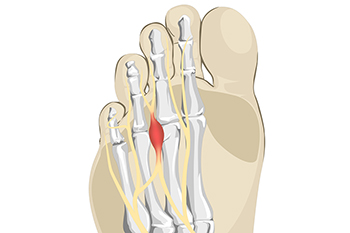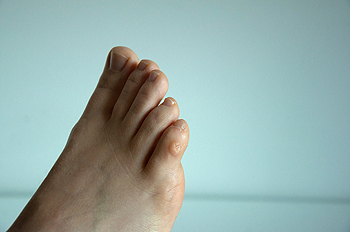Connect With Us
Blog
Items filtered by date: January 2022
Morton’s Neuroma in Runners and Others
 Many runners develop a condition known as Morton’s neuroma which is a thickening of a nerve in the foot. It usually affects the large nerve between the third and fourth toe, which is more susceptible to pressure, irritation and injury, and results in painful inflammation. Runners and people playing sports that involve pressure on the ball of the foot are more apt to develop this condition. Also, women wearing high heels, with a lack of room in the toe box and improper cushioning are susceptible. People with flat feet, high arches, bunions or hammertoes are also at risk. Morton’s neuroma is thought to be a progressive ailment, and for that reason diagnosis is often delayed until the condition becomes more severe. At some point, the symptoms become more painful and frequent and last longer. Many people complain of having a pebble in their shoe or feel like their sock is bunched up. It is suggested that you consult with a podiatrist at the earliest onset of such symptoms for a diagnosis and treatment plan.
Many runners develop a condition known as Morton’s neuroma which is a thickening of a nerve in the foot. It usually affects the large nerve between the third and fourth toe, which is more susceptible to pressure, irritation and injury, and results in painful inflammation. Runners and people playing sports that involve pressure on the ball of the foot are more apt to develop this condition. Also, women wearing high heels, with a lack of room in the toe box and improper cushioning are susceptible. People with flat feet, high arches, bunions or hammertoes are also at risk. Morton’s neuroma is thought to be a progressive ailment, and for that reason diagnosis is often delayed until the condition becomes more severe. At some point, the symptoms become more painful and frequent and last longer. Many people complain of having a pebble in their shoe or feel like their sock is bunched up. It is suggested that you consult with a podiatrist at the earliest onset of such symptoms for a diagnosis and treatment plan.
Morton’s neuroma is a very uncomfortable condition to live with. If you think you have Morton’s neuroma, contact Michael Tomey, DPM of Cary Foot & Ankle Specialists. Our doctor will attend to all of your foot care needs and answer any of your related questions.
Morton’s Neuroma
Morton's neuroma is a painful foot condition that commonly affects the areas between the second and third or third and fourth toe, although other areas of the foot are also susceptible. Morton’s neuroma is caused by an inflamed nerve in the foot that is being squeezed and aggravated by surrounding bones.
What Increases the Chances of Having Morton’s Neuroma?
- Ill-fitting high heels or shoes that add pressure to the toe or foot
- Jogging, running or any sport that involves constant impact to the foot
- Flat feet, bunions, and any other foot deformities
Morton’s neuroma is a very treatable condition. Orthotics and shoe inserts can often be used to alleviate the pain on the forefront of the feet. In more severe cases, corticosteroids can also be prescribed. In order to figure out the best treatment for your neuroma, it’s recommended to seek the care of a podiatrist who can diagnose your condition and provide different treatment options.
If you have any questions, please feel free to contact our office located in Cary, NC . We offer the newest diagnostic and treatment technologies for all your foot care needs.
Are Bunions Affecting Your Everyday Life?
Sports Related Injuries of the Foot and Ankle
There are several types of foot and ankle injuries that can occur when playing sports. The most common sports injury is an ankle sprain. It is important for ankle sprains to be diagnosed and treated professionally, as an improperly healed sprain can lead to additional sprains, chronic ankle instability, and arthritis. Another type of injury athletes face involves the Achilles tendon, which can become inflamed, injured, torn, or even ruptured from repetitive activity or trauma. An inflammation of the plantar fascia on the sole of the foot (plantar fasciitis) can be caused by overuse or wearing shoes that are worn out or inappropriate for the sport being played. Running and court sports can lead to a compression of the nerve between the third and fourth toes. This causes the tissue surrounding the nerve to thicken and, left untreated, may lead to nerve damage. Stress fractures are another type of sports injury where a tiny crack develops over time in a bone due to repetitive activity, poor footwear, changes in activity, or other factors. If you have suffered any type of foot or ankle injury while playing sports, it is suggested that you contact a podiatrist as soon as possible.
Ankle and foot injuries are common among athletes and in many sports. They can be caused by several problems and may be potentially serious. If you are feeling pain or think you were injured in a sporting event or when exercising, consult with Michael Tomey, DPM from Cary Foot & Ankle Specialists. Our doctor will assess your condition and provide you with quality foot and ankle treatment.
Common Injuries
The most common injuries that occur in sporting activities include:
- Achilles Tendonitis
- Achilles Tendon Rupture
- Ankle Sprains
- Broken Foot
- Plantar Fasciitis
- Stress Fractures
- Turf Toe
Symptoms
Symptoms vary depending upon the injury and in some cases, there may be no symptoms at all. However, in most cases, some form of symptom is experienced. Pain, aching, burning, bruising, tenderness, tightness or stiffness, sensation loss, difficulty moving, and swelling are the most common symptoms.
Treatment
Just as symptoms vary depending upon the injury, so do treatment options. A common treatment method is known as the RICE method. This method involves rest, applying ice, compression and elevating the afflicted foot or ankle. If the injury appears to be more serious, surgery might be required, such as arthroscopic or reconstructive surgery. Lastly, rehabilitation or therapy might be needed to gain full functionality in the afflicted area. Any discomfort experienced by an athlete must be evaluated by a licensed, reputable medical professional.
If you have any questions, please feel free to contact our office located in Cary, NC . We offer the newest diagnostic and treatment technologies for all your foot care needs.
What Causes My Feet to Smell Bad?
 Foot odor is typically caused by too much sweat being produced by the glands in the feet. Each foot has about a quarter of a million sweat glands that produce around a cup of sweat a day. When bacteria from the soles of the feet are combined with sweat, an odor may develop. Causes include not washing your feet daily, wearing the same socks day after day, and wearing shoes so tight that they don’t allow the sweat to evaporate. In addition, a fungal infection can cause foot odor, and hyperhidrosis, a condition known as sweaty feet, can exacerbate the problem. To reduce existing foot odor, it’s a good idea to wash your feet daily with antibacterial soap and dry them thoroughly. You can also use an antiperspirant spray or powder on your feet. Change your socks every day, and give your shoes at least a day to air out before wearing them again. If, after taking these precautions, the odor lingers, it is suggested that you see a podiatrist who can examine the area and offer a more in-depth treatment plan.
Foot odor is typically caused by too much sweat being produced by the glands in the feet. Each foot has about a quarter of a million sweat glands that produce around a cup of sweat a day. When bacteria from the soles of the feet are combined with sweat, an odor may develop. Causes include not washing your feet daily, wearing the same socks day after day, and wearing shoes so tight that they don’t allow the sweat to evaporate. In addition, a fungal infection can cause foot odor, and hyperhidrosis, a condition known as sweaty feet, can exacerbate the problem. To reduce existing foot odor, it’s a good idea to wash your feet daily with antibacterial soap and dry them thoroughly. You can also use an antiperspirant spray or powder on your feet. Change your socks every day, and give your shoes at least a day to air out before wearing them again. If, after taking these precautions, the odor lingers, it is suggested that you see a podiatrist who can examine the area and offer a more in-depth treatment plan.
Everyday foot care is very important to prevent infection and other foot ailments. If you need your feet checked, contact Michael Tomey, DPM from Cary Foot & Ankle Specialists. Our doctor can provide the care you need to keep you pain-free and on your feet.
Everyday Foot Care
Often, people take care of their bodies, face and hair more so than they do for their feet. But the feet are a very important aspect of our bodies, and one that we should pay more attention to. Without our feet, we would not be able to perform most daily tasks.
It is best to check your feet regularly to make sure there are no new bruises or cuts that you may not have noticed before. For dry feet, moisturizer can easily be a remedy and can be applied as often as necessary to the affected areas. Wearing shoes that fit well can also help you maintain good foot health, as well as making it easier to walk and do daily activities without the stress or pain of ill-fitting shoes, high heels, or even flip flops. Wearing clean socks with closed shoes is important to ensure that sweat and bacteria do not accumulate within the shoe. Clean socks help to prevent Athlete’s foot, fungi problems, bad odors, and can absorb sweat.
If you have any questions please feel free to contact our office located in Cary, NC . We offer the newest diagnostic and treatment technologies for all your foot and ankle needs.
Getting Rid of Corns on the Feet
 A corn is a hard, yellowed bump or lump just under the skin of the toe or foot. It often develops when the toe rubs against the inside of your shoe, causing pain. People with diabetes or poor circulation may be more apt to develop corns. There are several treatments that can remove or eliminate corns, but if the underlying cause is not corrected, they are likely to recur. Pressure and repetitive friction are the main causes of corns and calluses on the feet. Wearing shoes that are not too tight, or too loose, can help reduce the pressure on the toes. When shoes are too tight or heels too high they can compress the foot; when they are too loose, the foot may slide and rub against them. A seam or stitching on the shoe also can cause repetitive friction. The best way to avoid corns is to wear shoes with room in the toe box, and socks that absorb moisture. Soaking the feet periodically helps soften the corns. For removal of a corn, it is suggested that you make an appointment with a podiatrist for safe treatment and prevention planning.
A corn is a hard, yellowed bump or lump just under the skin of the toe or foot. It often develops when the toe rubs against the inside of your shoe, causing pain. People with diabetes or poor circulation may be more apt to develop corns. There are several treatments that can remove or eliminate corns, but if the underlying cause is not corrected, they are likely to recur. Pressure and repetitive friction are the main causes of corns and calluses on the feet. Wearing shoes that are not too tight, or too loose, can help reduce the pressure on the toes. When shoes are too tight or heels too high they can compress the foot; when they are too loose, the foot may slide and rub against them. A seam or stitching on the shoe also can cause repetitive friction. The best way to avoid corns is to wear shoes with room in the toe box, and socks that absorb moisture. Soaking the feet periodically helps soften the corns. For removal of a corn, it is suggested that you make an appointment with a podiatrist for safe treatment and prevention planning.
If you have any concerns regarding your feet and ankles, contact Michael Tomey, DPM of Cary Foot & Ankle Specialists. Our doctor will treat your foot and ankle needs.
Corns: What Are They? and How Do You Get Rid of Them?
Corns can be described as areas of the skin that have thickened to the point of becoming painful or irritating. They are often layers and layers of the skin that have become dry and rough, and are normally smaller than calluses.
Ways to Prevent Corns
There are many ways to get rid of painful corns such as wearing:
- Well-fitting socks
- Comfortable shoes that are not tight around your foot
- Shoes that offer support
Treating Corns
Treatment of corns involves removing the dead skin that has built up in the specific area of the foot. Consult with Our doctor to determine the best treatment option for your case of corns.
If you have any questions please feel free to contact our office located in Cary, NC . We offer the newest diagnostic and treatment technologies for all your foot and ankle needs.


